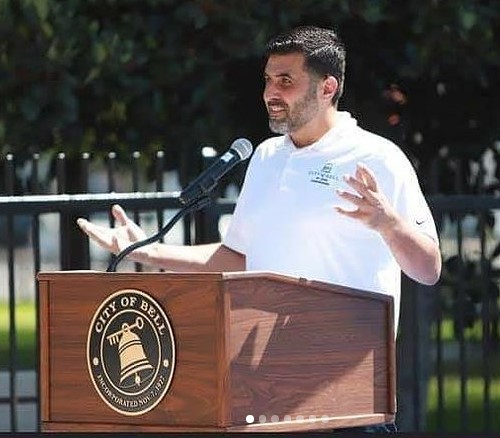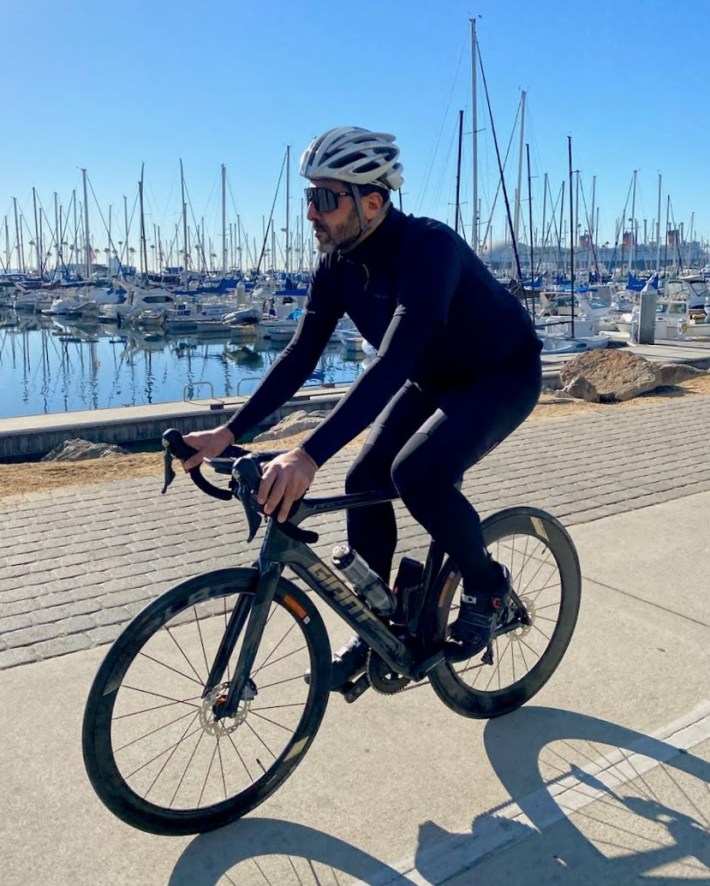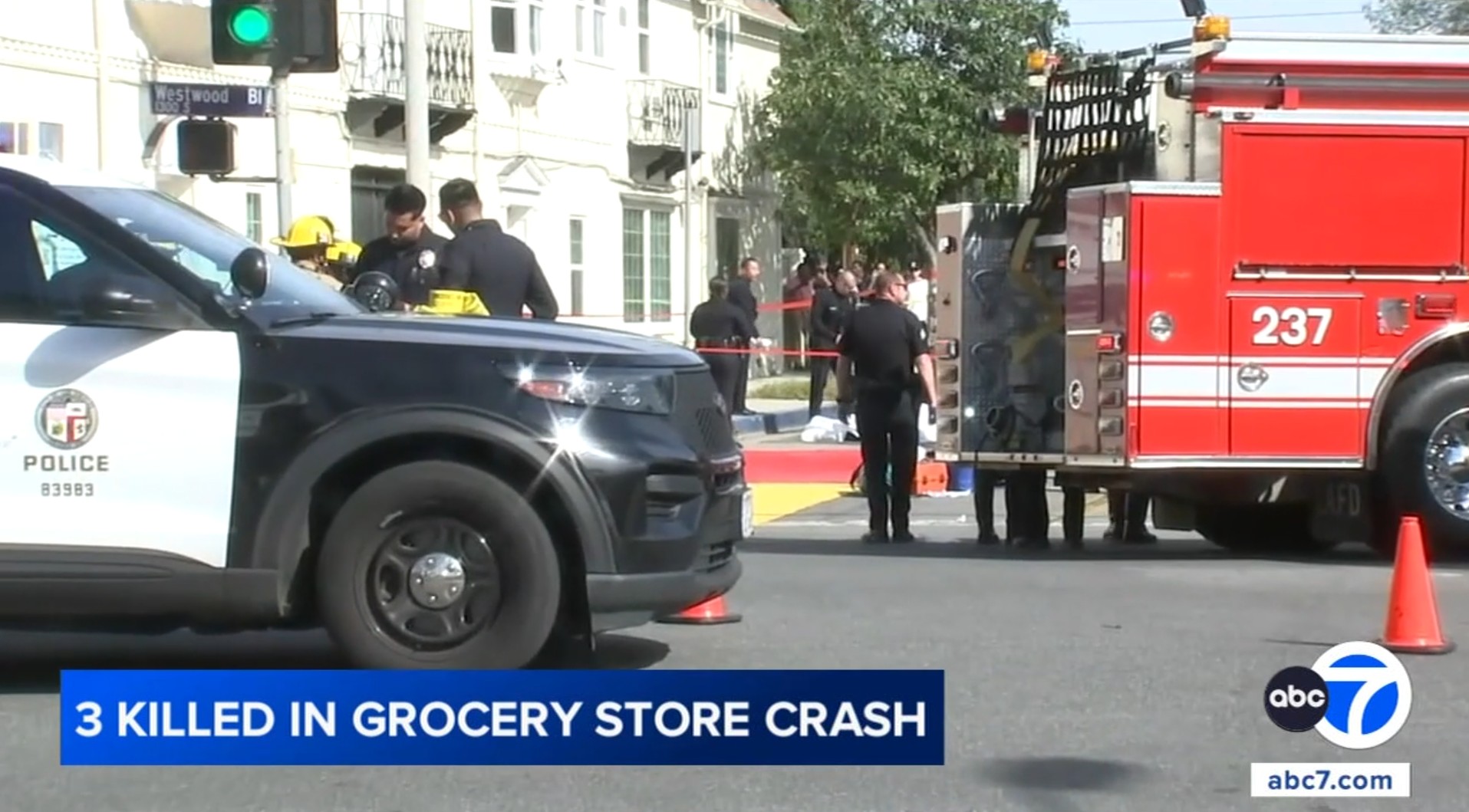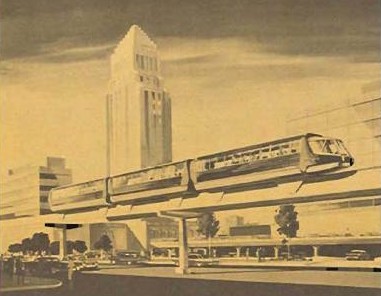Ali Saleh is the mayor of the city of Bell, located in southeast Los Angeles County. Saleh co-manages his family's clothing business, started by his parents who immigrated from Southern Lebanon to the U.S., settling in the city of Bell.
Saleh was first elected to the Bell City Council in 2011, following a recall election that ousted councilmembers involved in a corruption scandal. Saleh has championed smart growth, small business, public participation, and governmental transparency. He currently serves on the board of the San Gabriel and Lower Los Angeles Rivers and Mountains Conservancy. He is a past board president of the Gateway Cities Council of Governments, Regional Council boardmember for Southern California Association of Governments, boardmember for the Greater Los Angeles County Vector Control District, and boardmember for the Los Angeles County Sanitation District.
Mayor Saleh is running to represent the Gateway Cities on the Metro board of directors. (Officially the boardmember represents the "Southeast Long Beach" region which largely coincides with the Gateway Cities sub-region, an area that extends from Long Beach to Vernon to Montebello to Whittier to La Mirada.) Metro's current Gateway Cities representative, Long Beach Mayor Robert Garcia, recently announced that he will not seek a second term on the Metro board. The new Gateway representative will be elected by the sub-region's mayors at a January 6 meeting.
This interview was conducted via email this month.
SBLA: Let readers know a bit about your background - where you grew up, what led you to becoming who you are today.
Ali Saleh: I am one of three sons born to Lebanese immigrants who moved to the City of Bell in the early 70’s, fleeing the human and economic devastation of a civil war. I was born and raised in Bell, and I'm raising my three sons in Bell. I attended the local public schools, and began working in our small family business as a teenager.
In 2010, a scandal broke out in the city which made national news. As I learned more about the corruption that was riddling our city and my hometown, I felt compelled to get involved in hopes of bringing a voice and ultimately justice to our community. I co-founded an organization called BASTA (Bell Association to Stop the Abuse), which means “enough” in Spanish, which depicted how we all felt. My fellow reformers and I were successful in recalling the corrupt councilmembers and city administrators, who were convicted of corruption. This led to my first election campaign and victory in 2011, and this is when the true work began. We turned a city in dire straits with a $60-million deficit into one that is transparent and truly serves its constituency. Today, we have a $15 million-dollar reserve.
Some readers may be unfamiliar with the City of Bell - could you explain a bit about your city - and the Southeast L.A. County area?
The City of Bell and our neighboring Southeast cities, are part of the Gateway Cities within Los Angeles County. We are in close proximity to transportation corridors including the Santa Ana and Long Beach freeways. While the Gateway Cities face social and economic challenges, they retain assets including strong connections to transportation networks and resilient hard working individuals with rich traditions and cultures. Bell is known as the key to industry, given its location in the heart of the central Los Angeles industrial market.
In your decade of elected service in Bell, what are some accomplishments you are proud of?
I am proud of a number of things, but in particular, of turning our city’s budget around. When the new council started after the recall, not only were we in a deep hole from the recession - like the rest of the country, but the mismanagement and corruption also pillaged the city of millions of tax dollars. My peers and I got to work, not just to stabilize the city finances, but to create a more transparent and responsive government that encourages the public's participation. We turned a city in dire straits with a $60-million deficit into one that is transparent and truly serves its constituency.
In addition, we have received an "A-" rating from the Sunshine Review for [our] demonstrated commitment to online transparency - providing the public greater access to city documents, including the Bell City Charter, a City Employee Compensation Listing, Annual Budgets, and Audits – all in a concerted effort to continue to build an open government both within Bell City Hall and the virtual world.
In my ten years, I have a proven history of holding government and special interests accountable, while finding ways for the public to be part of the decision-making, and that has been one of my proudest accomplishments. One example is our budget - we hold regular town halls that allow the public to be part of the decision-making around identifying priorities.
You're running for the Gateway Cities seat on the Metro board. What would your priorities be at Metro?
If elected, two of my immediate priorities would be for the expansion of the Eco-Rapid Transit [also called the West Santa Ana Branch rail line], which is an environmentally friendly high speed transit and the expansion of Metro’s [Eastside] Gold Line, for travel from East Los Angeles to the City of Whittier; both of which are a priority for my peers in the region.
In addition to being a voice for my peers, I want to ensure Metro continues to prioritize equity in its decision making. Representing a small city, with a working class, immigrant community, I know that we are often forgotten or at the end of the line. I want to make sure we have a voice at the table and are working collaboratively with our bigger cities because we depend on each other.
We also need to elevate issues of equity around the users of public transportation and ensure that when we are planning for a system that gets us out of our cars, low income communities of color are front and center because they're the ones already using the system.
Metro's West Santa Ana Branch rail project has a station planned at Florence and Salt Lake Avenues - in the city of Huntington Park, but basically across the street from Bell. What's your take on that project and how it would impact Bell and the Southeast Cities?
The West Santa Ana Branch project will bring a lot of opportunity and attention to the region and that’s precisely why a Southeast voice is needed on the board. Our Southeast Cities have been historically underinvested in, even though our residents are more likely to be utilizing Metro’s rail lines to get to work, shop, and visit family and friends across Los Angeles. The project needs to meet the needs of those who will use it the most.
One of the more controversial Metro projects in the Gateway Cities sub-region is the 605 Freeway Corridor Improvement Project, which Metro announced would demolish hundreds of homes, mostly in the cities of Downey and Santa Fe Springs. What is your take on the 605CIP?
Although our Gateway communities deserve access to quality transportation infrastructure investment, our residents should not continue to bear the burden of these projects and Metro should not be in the business of demolishing homes and displacing residents, especially in already-vulnerable working communities of color. The 605 Improvement Project needs to be revisited to ensure that homes are not torn down, particularly in a housing crisis. Moreover, as a boardmember, I am committed to listening to our local leaders who will be the ones affected by Metro’s future projects.
You're a cyclist and have pushed Bell to plan and implement bikeways. Let readers know about your bicycling story - what sorts of cycling do you do, what role do you see cycling playing in your city and the region, and what role you see Metro playing in this?
That’s correct. I’m a cyclist and have been so for 5 years. Cycling has been a way for me to more intimately connect to our Gateway region, my city, and the Lower Los Angeles River. I ride on weekends with some friends and my kids - from Southeast Los Angeles to Long Beach or to Turnbull Canyon.
Since I’ve been on council, we’ve passed Bell’s first Bike Master Plan to bring our city’s cycling needs to the forefront of the conversation. Cycling is something that many of our residents participate in, whether it’s for fun or by necessity, and it’s a method of transportation that we should be actively encouraging more of, especially with the West Santa Ana Branch project coming soon to Southeast Los Angeles. A first-last mile connection to the rail line is vital to safer streets in our communities.








